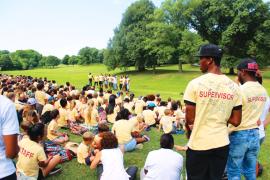Two years ago Carlos Vega was a shy, middle-school student.
The summer after eighth grade he received a scholarship to attend a month-long session of camp from Blue Star Camps in Hendersonville, North Carolina. While attending the camp, he met young people from all across the country and many who live in different parts of the world. In his cabin alone, there were boys from Israel, France, California, and Florida.
He says this camp experience at Blue Star changed him.
"I used to be very quiet and shy, and now I'm more open and social. I want to be involved in everything," says the fifteen-year-old high school student. Vega loves sports, especially soccer, and has a talent for drawing. He sees himself attending an art institute after graduating from high school and someday becoming a cartoonist.
Western North Carolina, with one of the highest concentrations of organized camps in the United States, has long been a mecca for summer campers. The children attending camp have traditionally come from out of state and even other countries. Very few children who live in the area know much about the camps that are literally in their backyards. Most families cannot afford to send their children to the camps.
This is changing, thanks to the Henderson County Young Leaders Program (HCYLP). Now Vega and many other young people like him are being given the gift of summer camp, along with a year-round mentoring program. The belief is that camp has the potential to change lives, and the hope is that these children will become future leaders in their communities.
About the Program
"Leadership for Life" is the theme for the program, its purpose is to develop character, citizenship, and leadership through camp experiences for local children who would otherwise lack the opportunity.
It is a nonprofit corporation operating under an independent, volunteer board of directors. Program partners include the Henderson County Public Schools, the Boys & Girls Club, and representatives of the entire Henderson County summer camp community.
Board Chairman Frank Byrd began his association with camps as a counselor at Camp Mondamin in Henderson County, where he chose to return to live, work, and raise a family.
"Ever since I had the opportunity to work at a private camp as a college student in the early 1960s, I've wanted to find ways to make the experience available to children whose families, like mine, would never have been able to pay camp tuition," Byrd said.
"The HCYLP is trying to do just that for children in our community," he says, "taking promising but financially disadvantaged young people and introducing them to camp experiences that have the potential to enhance their lives dramatically — especially their view of themselves and their potential and their relationship to the natural world around them."
What makes the program unique is the true community collaboration among schools, local camps, and the Boys & Girls Club.
"This collaboration makes it possible to offer a lot more bang for the buck in terms of opportunities for children," Byrd said. "The cooperation of the local summer camp community has been wholehearted, with scholarships offered for regular camp sessions each summer, our weeklong camp session provided by a local camp at cost, and much of the leadership on our board coming from the camps."
Here's How It Works
Participating children are first nominated by school counselors, teachers, and supervising adults — with the program offering a progression of four distinct programs with eligibility for each based on success at the previous level.
- The first level starts with weekend camp sessions at Kanuga's Camp Bob every spring and fall, each hosting sixty to sixty-five third through sixth graders. Campers get a sampling of sports, arts and crafts, and a leadership class. Camp Bob Director David Griffin says the weekend program is for children "to come out and just have some good clean fun" and also for community building and learning how to be better citizens. "I tell them part of what this weekend is about is practicing to become a leader. Then you go out into the real world and try the same techniques."
- If a child does well at the weekend camp, he or she may earn a full week of camp in August — this year at Camp Ton-A-Wandah with some sixty campers. Here participants build on the activity and relationship skills introduced to them at the weekend session.
- After a successful weeklong camp experience, a participant may be invited to join Pathmakers, a yearround leadership and mentoring program serving about twenty-five children. Operated in conjunction with the Boys & Girls Club of Henderson County, this program reinforces the gains made by children from the previous summer through mentoring and monthly activities. These events are designed to be fun with an emphasis on community service, learning, and personal development.
- As a result of positive performance in the Pathmakers program, children may earn scholarships for multiweek camp sessions offered by local summer camps. Participants must have progressed through the previous three levels and show potential for growth and leadership. Sixteen children received full scholarships to summer camps this year.
Counselors at the public schools and the Boys & Girls Club have been involved in choosing the participants since the beginning of the program. They are asked to select students who exhibit signs of leadership, have diverse backgrounds, and would not otherwise have the opportunity because of a lack of resources. The students fill out an application that includes a short essay on why they want to come to camp.
The Benefits
Elementary school counselor and HCYLP board member Emily Ingram sees firsthand the impact the experience has on participants.
"We have all these wonderful camps in our area. It's a shame to think they are just for people who are from out of state," she said. "It's a great opportunity for the kids here. We have many kids who hardly ever leave their neighborhoods. The biggest thing this program does is broaden their horizons and give children positive experiences."
This program is good for children who need to see positive role models, too, Ingram says. "When you are at camp you work closely with cabin counselors and others. You get to see what people can do."
Just listen to how several children at the spring Camp Bob weekend session described what camp gives them: "A chance to get away from home, leave your circle of comfort, learn new things, meet new people, try new experiences. . . . And soon your comfort zone expands."
It's just these kinds of experiences Blue Star Camps Director Tom Rosenberg wishes for all children. He grew up going to Blue Star and even worked there in the summers during college. "It took hold. I left banking and returned to Blue Star professionally nineteen years ago," he said.
Ideally, all children should have the chance to go to camp, Rosenberg says. Finding a way to make that happen is not easy. "This is a start, offering scholarships to local campers. It's a win-win situation for the youngsters, the community, and the camps."
For local campers like Carlos Vega, who was at Blue Star two years ago, and this year's scholarship recipient, Joseph Aaron Graham, Rosenberg hopes coming to camp "opens their eyes to many opportunities and possibilities."
"Going to camp for four weeks gives campers the chance to develop deep relationships and learn new skills.We want them to experience all the intensity and density of camp and really enjoy their summer."
How It Started
The program actually sold itself to the community, says founder George Howell. It all started in 1994 when Howell was having lunch with Kanuga Conferences Director Albert Gooch during a weeklong summer camp session there for inner-city children from Atlanta. "We got our first taste that day of a rowdy bunch of summer campers having a good time. I turned to Albert and asked him ‘Why don't you have a camp like this for the disadvantaged children here in Henderson County?' "
Gooch called Howell within the week. "He said if you will find the kids, and if you can find some volunteers to help my staff, we will run the camp for you and discount the fees 40 percent."
Six weeks later, Howell had raised about $4,000 and recruited six to eight volunteers to run the camp on a weekend.
"We only had fifty-five campers that first year," Howell said. But the new program continued to grow. "By the time we got rolling, we were funded by civic clubs, churches, businesses, and foundations. The only limit to raising money was time and the ability to go talk to people."
After stepping down as chairman five years ago, Howell stayed on the board and continued to help raise money. As the program expanded, Howell says he saw what it could mean to the community. "If Henderson County is going to continue to be the jewel that it is, you have to train the future leaders. That is what we are doing."
Robert Danos, assistant director of Camp Mondamin, has been on the HCYLP board for several years. He is credited with getting the summer camp community involved. The job was easy, he says, because most of these camps were already offering some scholarships and had their own outreach programs. They were excited to have a program to work with that involved local children. "I didn't have to urge them or sell them," Danos said. "They were onboard."
Little Lost and Much Gained
This year local camps are giving full scholarships to sixteen children from the program to attend multi-week summer camp sessions.
The scholarships are truly a gift to the children of Henderson County, says program founder George Howell. "When Frank came up with the idea of involving all the camp community, I was amazed at the response from them," Howell said. "They were giving up revenue, but they wanted to be part of it."
Though some revenue may be lost by offering scholarships, most camp directors agree there's much more gained.
"Sometimes there is lost revenue, but we have a very generous alumni donor base; this helps defray any loss," Danos said. "What we gain is the chance to show the rest of the community we are here. Camps by their nature tend to be hidden from public view. This offers us the chance to come together as a group to do good work as a team."
And what do the children gain? "No one really knows who is here on scholarship and who is not," Danos said. "They all learn to become friends with kids who might look different or be from a different socioeconomic background, but the bottom line is the same. They go into the woods, and they have a good time."
Darrin Thompson is one of those kids having a good time. The twelve-yearold fifth grader was invited to Camp Mondamin again this summer, his third year there on scholarship.
"It makes me feel happy and proud of myself for being able to get scholarships for such a good camp," he explained as he gathered with other program participants at the Boys & Girls Club.
Last summer Darrin progressed to a high enough level in mountain biking to earn a three-day, off-campus trip, an adventure he's planning to repeat this year.
Another favorite camp experience is the gatherings with the Green Cove Camp girls for cookouts and other events. "Sometimes they come over, and sometimes we go over. And you can get a girlfriend there," Darrin said with a smile.
Licia Gaut-Correll is a freelance writer in Hendersonville, North Carolina. For more information about the Henderson County Young Leaders Program and the Pathmakers Program, contact Paige Hafner, program director, 828-697-2000, or via e-mail, [email protected].
Originally published in the 2009 September/October issue of Camping Magazine.


